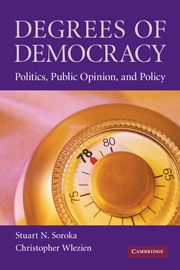Book contents
- Frontmatter
- Contents
- Preface
- Degrees of Democracy
- 1 Public Opinion and Policy in Representative Democracy
- 2 The Thermostatic Model
- 3 Adding Issues and Institutions
- 4 Public Preferences and Spending
- 5 Parameters of Public Responsiveness
- 6 Public Responsiveness Explored
- 7 Policy Representation
- 8 Disaggregating Public Responsiveness and Policy Representation
- 9 Degrees of Democracy
- Appendix
- Bibliography
- Index
7 - Policy Representation
Published online by Cambridge University Press: 05 June 2012
- Frontmatter
- Contents
- Preface
- Degrees of Democracy
- 1 Public Opinion and Policy in Representative Democracy
- 2 The Thermostatic Model
- 3 Adding Issues and Institutions
- 4 Public Preferences and Spending
- 5 Parameters of Public Responsiveness
- 6 Public Responsiveness Explored
- 7 Policy Representation
- 8 Disaggregating Public Responsiveness and Policy Representation
- 9 Degrees of Democracy
- Appendix
- Bibliography
- Index
Summary
We have seen that the public responds to policy change. This is true across many domains and across several countries. The finding is of importance unto itself, to be sure. It also provides the basis for policy representation. That is, public responsiveness provides the critical incentive and information for representation by policymakers. Whether policymakers respond in kind is the subject of this chapter.
We begin below by reviewing and then estimating our model of policy representation across policy domains. We discuss the results with a particular focus on how they relate to our findings in previous chapters. If public responsiveness is the incentive for representation, the two should covary – increased responsiveness should translate into increased representation. We test this hypothesis here. Recall that we have also posited that government institutions should matter for representation, even taking into account public responsiveness. Specifically, governments in parliamentary systems are expected to be less responsive to preferences than (Madisonian) presidential ones. This possibility is considered here as well.
Beyond these primary concerns, we explore additional issues in representation, following in part the analyses of feedback in Chapter 6. In particular, we examine the possibility that representation is stronger for budgetary policy (appropriations) than actual expenditures (outlays). We also examine the degree to which representation increases alongside electoral marginality – just as public responsiveness creates an incentive for representation by policymakers, so too may electoral pressure.
Information
- Type
- Chapter
- Information
- Degrees of DemocracyPolitics, Public Opinion, and Policy, pp. 125 - 144Publisher: Cambridge University PressPrint publication year: 2009
